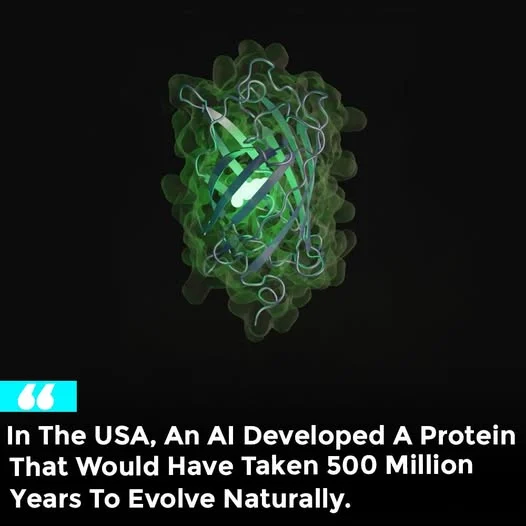Artificial intelligence (AI) is gradually affirming its significant role in biology and medicine, and one of the impressive breakthroughs recently is the ability to simulate natural evolution to create new proteins. Scientists have used AI to design a protein capable of glowing, similar to the fluorescent proteins found in jellyfish and corals. This process not only accelerates research progress but also opens up opportunities for developing new treatment methods.
Recently, a research team at the University of California employed the AI model “EvolutionaryScale Model 3” (ESM3) to simulate the evolutionary process of proteins. By analyzing vast amounts of biological data, ESM3 reconstructed protein sequences after millions of years of evolution, leading to the discovery of a blue fluorescent molecule with novel properties. This marks the first step in using AI to generate proteins with unique characteristics, expanding their potential applications in medicine.

Proteins designed through AI-driven evolutionary simulation may be the key to developing new therapeutic treatments. Creating proteins with specialized functions can aid in treating diseases such as cancer, cardiovascular disorders, or genetic conditions. This approach not only saves time compared to producing proteins via traditional methods but also offers higher accuracy, making treatments faster and more effective.
In a survey on the role of AI in biology, Dr. David Baker, a professor at the University of Washington and a leader in protein research, shared that: “AI will change the way we approach and understand biological evolution. AI tools help create proteins not only from existing genetic traits but also enable the design of proteins with entirely new functions, paving the way for breakthrough treatments.”
The advent of AI models like ESM3 demonstrates the convergence of cutting-edge technology and modern medicine. The ability to simulate evolution in a short time will transform research methods and drug development in the future. This is a positive sign for the pharmaceutical industry, offering hope for effective therapies that are accessible to everyone.
A practical example that illustrates the importance of this technology is the development of gene therapies. Designed proteins may play a vital role in advancing genetic treatments or tissue regeneration. Moreover, the creation of fluorescent proteins will help doctors monitor changes in patients’ bodies, leading to more accurate treatment decisions.
“AI not only accelerates scientific progress but can also help turn technologies that once seemed like science fiction into reality,” emphasized Dr. Margaret Sutherland from the Institute for Genomic and Medical Research during an AI in medicine conference in 2023.
The development of AI in biology paves a completely new path in research and drug development. In the future, we may witness the emergence of unprecedented treatment methods, bringing hope to many patients around the world.


HPX24h > Science > AI Can Simulate Evolution and Create Proteins – A New Opportunity for Breakthrough Medical Therapies
Tagged Articles
Work 3.5 Days a Week and Live to 100: This Could Be Your Future
AI Can Make Life Easier, But Is It Harming Your Ability to Think Critically?
Top Reads from This Category
Science
Discovering Enzymes That Stimulate Hair Regrowth: A New Opportunity in Hair Loss Treatment
Science
NSF Cuts 168 Jobs Amid Booming Science and Technology: Paradox or Strategic Move?
Science
Regrowing Adult Teeth in Just 9 Weeks: Science Turns the Impossible into Reality
Science
Direct Brain-to-Brain Communication via the Internet
Science
Implanting an NFC Chip into the Hand – When Technology and Humans Merge
Science
Successful Penis Transplant Surgery: A New Breakthrough in Medical Science
Science
Discover Blood Testing Technology Without a Visit to the Doctor
Discover New Topics
Fitness
Postpartum Fitness: Secrets to Maintaining an Active Routine for a Quick Recovery
Healthy Eating
The optimal diet for leaky gut syndrome: Scientific solutions and practical advice
Animals
The Care of Offspring: The Reproductive Secrets of Guppies
Fitness
Muscles: The Golden Key to Effective Health and Performance
Space
Gamma Ray Bursts and the Key to the Chemical Composition of the Early Universe
Space
Habitable Exoplanets: Exploring Distant Worlds
Healthy Eating
The Comprehensive Guide to the 16:8 Intermittent Fasting Diet
Parenting Tips
How to Talk to Your Child About Smoking Issues
Animals
The Stunning Image of a Cheetah in Action During Its Hunt
Health
Exploring How Microplastics Enter the Body and Affect Health
Fitness
Effective Workout Tips: The Best Full-Body Exercises for Health
Parenting Tips
How to Prevent a 2-Year-Old from Throwing Things?
Healthy Eating
Health is ‘Declining’ Due to Processed Foods: How to Turn the Tide